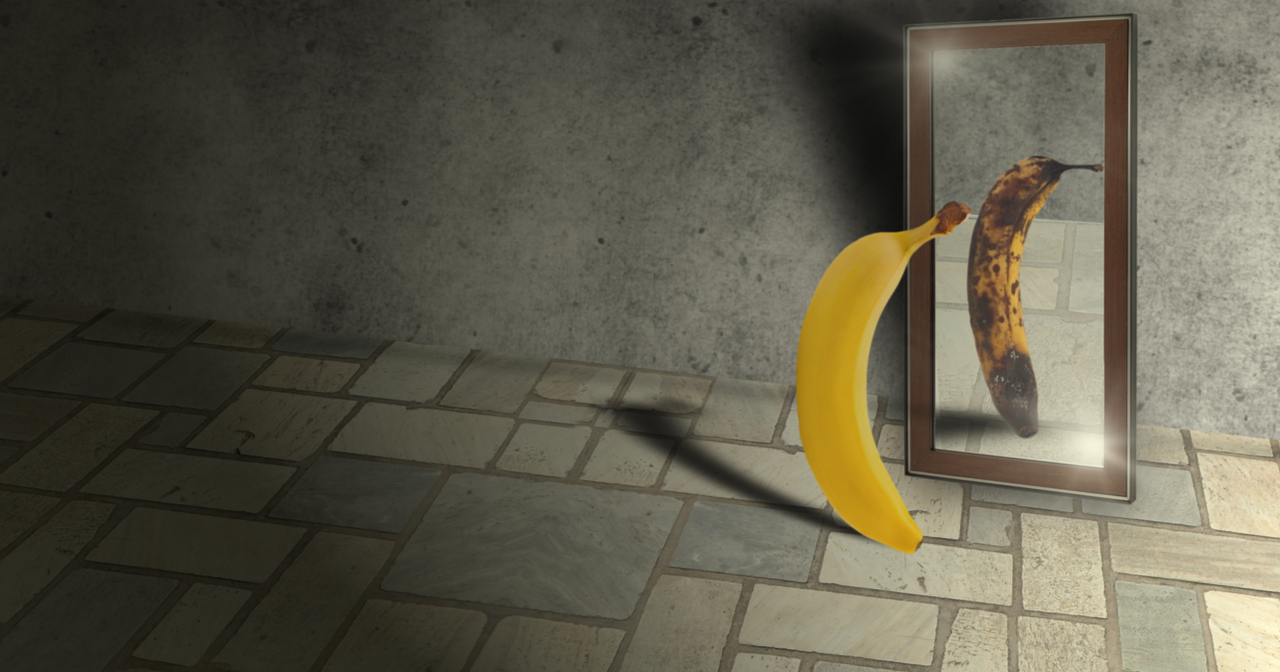I have realised that self-worth – or lack thereof – is a battle that needs to be spoken about.
When people feel a lack of self-worth, they often skim over it, placing their mind elsewhere and focussing their energy into something else so that they don’t end up at the bottom of a hole with no way out. However, there are times when a lack of self-worth can consume a person. The person you once knew is now obsessed by every little thing they think may be wrong with them. It seems like a bitter pill to swallow, but from what I have seen, when you have an unhealthy attachment to the dunya, it is so much easier to ‘hate’ yourself than to love who you are or who you can become.
There are so many moments in life that we experience where we truly question ourselves: who am I? Why do I not have this? Why do I keep failing? What is so wrong with me? We are almost forced by the society that we live in to constantly question our worth. It’s like we are fighting a losing battle. As long as we live in a time where everything seems to be perfect, and where everyone puts up a front of having it all, we begin to believe the lies we tell ourselves.
I could spend all day talking about the idea of filters, which are now accessible to all on most social media platforms. We are being sold this false sense of perfection, this airbrushed façade, and we so willingly believe it. I now know so many people who cannot take a picture without using a filter. Why have we allowed ourselves to reach the point where the way we were made and the intricacies of our faces are not worthy enough to be seen? What makes you who you are is no longer good enough; there is a standard that needs to be met. Although there is goodness in social media, I am unsure whether it outweighs the bad. There are girls as young as nine years old who have become obsessed with other people’s lives. Access to such content creates a toxic mindset for an adult, so imagine the power it has over a child whose mind is malleable, trying to find any way they possibly can to fit into a society that capitalises off their insecurities.
It is important to also realise that whilst the social narrative of perfection and social media is at its peak, Muslims should not be spending time on such outlets that may affect our well-being and make us question our identity. It is difficult to change the narrative, but if you know that social media has negative effects on you, take a step back. You may not be able to change society, but you can most definitely with the permission of Allāh begin to change your own habits, which will have a long-lasting effect.
This is the case for nearly every Muslim girl living in the West. It’s not only social media – it’s also external influences and the way we treat ourselves. We are already living and dressing in a way where, unless we are surrounded by the same people, we feel completely alienated and judged harshly because of what we look like. Dealing with this whilst having a lack of self-worth results in no choice but to be consumed by the very thing we tell ourselves not to worry about.
Before we continue, let us discuss the struggle for sisters who are visibly Muslim because of their outward appearance. Social media and the ideals of beauty have made it even harder to wear the hijab. There are times where you may question what you wear or how you dress. This could be because of fashion trends or rising Islamophobia. I whole-heartedly say to all the sisters who are struggling that every struggle in the path of Allāh is rewarded. It is difficult, but do not ever lose sight of the ‘why’, because seeking Allāh’s pleasure and seeing the highest ranks of Jannah for yourself is permanent. We live in world that is designed to test us. It was never meant to be easy, but, my dear sister, I understand the hardship you are going through, and I plead for you to remember that Allāh sees you, hears you, and knows your heart. Do not give up on this journey. One day, you will see the immense reward granted to you for your struggle.
Self-worth placed in the right things is a beautiful thing. Being kind to yourself and loving the way that your Lord created you is an incredible feeling. This is why I believe we should all be on a journey to really discover who we are and value every part of ourselves. Indeed, we are all flawed and should be holding ourselves accountable to be the best possible Muslims we can be. Arrogance has no place in our religion, and I do not think we should suddenly become obsessed with who we are and love ourselves to the point that we think we are better than others. However, I do believe that we should be able to look in the mirror and not wince. You should take a moment to appreciate the fact that your heart is beating every second to keep you alive, and that there is goodness in you. You should never let your flaws or shortcomings consume you and make you believe that you are awful, because that is not true.
Low self-worth goes hand in hand with believing that you are not deserving. There are people who have hated themselves, and then sat down to make du’ā after Maghrib salāh but find themselves short of words. This person no longer feels she can ask Allāh for anything. She sees herself as so flawed that she tells herself she does not deserve any form of happiness, nor is she deserving of her Lord’s mercy. This is deeply troubling, as many people may believe that this is something personal that the person will get over. However, this becomes dangerous as soon as it begins to affect your relationship with Allāh. This is not a case-by-case situation; in my experience, most girls have felt or still feel this way.
I also believe that brothers go through this, but I can only speak from my experiences and of those around me. The reason I think women and girls struggle with self-worth is because they assign their worth to the way they look. This is not entirely our fault. Society, both Muslims and non-Muslims, forces down our throats the notion that we should look perfect. The trigger of feeling this way could be anything, but from what I have seen, it stems from placing too much importance on the way we look. We compare ourselves to social media influencers, unable to look further than our flaws. We place people on pedestals and assign our outer appearance as the reason for rejection or lack of proposals in marriage.
We focus heavily on other people’s uninformed opinions of ourselves. We place so much value on what someone may think of us and then force ourselves into this downward spiral. I was once given advice to take the good from what everyone says; their opinions could be so wrong about you but find what’s worth hearing and understanding, and if you cannot find the good, just leave it rather than overthinking what they may have meant. What struck me is that we care so much about others, but what is our image in the sight of Allāh? We all know the hadīth of Abu Huraira who reported that the Messenger of Allāh said, “Verily, Allāh does not look at your appearance or wealth, but rather He looks at your hearts and actions.”[1] Neither your physical beauty nor your possessions are a measure of virtue; instead, your heart and your taqwa is what is virtuous in the eyes of Allāh.
The feeling of no self-worth would be so much harder if we were not Muslims, but Alhamdullilāh for a Lord that is ours. My sister, as soon as you realise that you were created to worship Allāh – the Most High, the Most Generous, the Most Kind, and the One who loves you more than your own mother – you will then understand that your worth is not based on what you look like or the shortcomings you are trying to fix. You are a slave of Allāh and He made you. Next time you look in the mirror or question the way you look, know that you were fashioned by the Lord of the universe Who created the Sun and the Moon and all the things you find beauty in – the Lord of all this is the One who also created you.
[donationbanner]
Source: www.islam21c.com
Notes:
[1] Muslim










Jazaak Allahu khair sisters.
Regarding: “What struck me is that we care so much about others, but what is our image in the sight of Allāh?”
People can sometimes hold us hostage to accepting the unacceptable because of the worry about what others will think. Therefore, caring less about what others think about us AS LONG AS Allah is either pleased with us or at least knows that we struggled to try and do the right thing or struggled to try and find what the right thing to do is, is extremely liberating. However, despite the benefit of feeling liberated, which loosens the power that others have over us, it is very difficult to accept caring less about what others think as ‘not wanting one’s enemies to rejoice’ is a ‘thing’ in our religion. For example, Haroon (AS) mentioned it when Musa (AS) gripped him and pulled his beard, after he returned from speaking to Allah and the Bani Isra’il had made the golden calf in his absence.
Regarding: “A pattern worth breaking is making yourself always accessible to someone who does not prioritise you, in a marriage, in a friendship, at work, generally in life.”
Again, it’s difficult to strike the right balance because ‘being accessible’ might be who we really are. It could be something that Allah made easy for us. If, mostly, we try to live by the principle that we should help others in their time of need so that Allah helps us in our time of need, then not being accessible can feel really scary, even if it’s only to those who harm us. Continuing to be accessible but with healthier boundaries is probably the right thing to do.
I should give credit where credit is due, so my husband mentioned the following incident a couple of days ago. We can’t remember why he mentioned it but I feel that it helps bring clarity to this issue.
From the long narration of ‘Aishah regarding the Ifk (narrated in Sahih al-Bukhari):
Abu Bakr As-Siddiq who used to disburse money for Mistah bin Uthatha because of his relationship to him and his poverty, said, ‘By Allah, I will never give to Mistah bin Uthatha anything after what he has said about Aisha.’ Then Allah revealed:– “And let not those among you who are good and wealthy swear not to give (any sort of help) to their kinsmen, those in need, and those who have left their homes for Allah’s cause, let them pardon and forgive. Do you not love that Allah should forgive you? And Allah is oft-Forgiving Most Merciful.” (24.22) Abu Bakr As-Siddiq said, ‘Yes, by Allah, I would like that Allah forgive me.’ and went on giving Mistah the money he used to give him before. He also added, ‘By Allah, I will never deprive him of it at all.’
Emphasis nowadays is all about perception and how we are perceived. It’s not really about the person, their character is pushed aside, in favour of filters and the smoke & mirrors culture of social media platforms. This is highly unhealthy.
Self worth is fundamental to one’s happiness, as women we quite often tend to settle, which is very detrimental and we do an injustice to ourselves. Realising one’s worth is incredibly liberating. Take for example in a marriage, if you are left wondering regularly, if your spouse truly cares for you, they don’t. When people care, you know it, there’s no wondering, no need for excuses, you’ll know it because you’ll be their priority. You’ll see it on a daily basis, they validate you, they see you, they prioritise you. It’s tangible!
A pattern worth breaking is making yourself always accessible to someone who does not prioritise you, in a marriage, in a friendship, at work, generally in life.
Be brave, be kind to yourself, be patient, know your own worth and one day you’ll wake up and be exactly where you want to be. In’sha’Allah
Such beautiful advice, Jazakillahu khaira